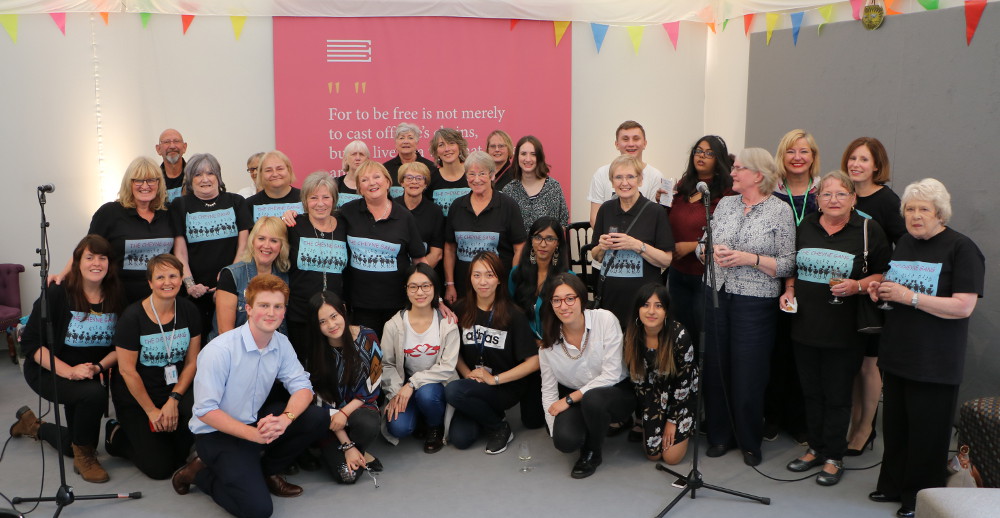
In this post, Dr Helen Szoor-McElhinney, an Engagement Strategist in the Deanery of Clinical Sciences, showcases the University of Edinburgh’s first Interdisciplinary Health and Wellbeing Science Shop, Our Health. A Science Shop is a small entity that carries out “scientific research in a wide range of disciplines – usually free of charge and – on behalf of citizens and local civil society” (www.livingknowledge.org)…
The ideas and pedagogical concepts that came together to create Our Health did so gradually over 5 years whilst working as an Engagement Strategist within the Proteus EPSRC Interdisciplinary Research Collaboration. My engagement practice provided me with many opportunities to observe researchers from different disciplines working together as a cohesive team to research some of the most urgent medical challenges of our time. It was fascinating for me to watch and learn researchers apply their own academic rigour to the particular research question, while simultaneously acquiring an interactive expertise of other disciplines. I felt inspired and enlivened by the power of interdisciplinarity and what it could achieve.
During this time, I had often thought about how I could harness the power of interdisciplinarity and use it to enhance the public engagement with research I design and develop for the team. I knew that I wanted local communities to benefit from the work. It also felt important that I look to them to drive the research: what were the health challenges and questions that were most pressing for them? What health research agendas would they set if they could?
I also imagined that by creating interdisciplinary teams of undergraduate and postgraduate students to work on the research questions as part of their studies, they too could benefit from enriched learning experiences, learning alongside community partners and co creating the research together.
The first Our Health pilot projects were launched in July 2018 and ran for 7 weeks across the summer break. Undergraduate and postgraduate students from across all three colleges enrolled onto two separate projects and formed interdisciplinary teams with two community partner groups, Breathtakers and the Cheyne Gang Choir. It was these partner groups who set the research questions. For example, the Cheyne Gang, a choir who live with the lung condition chronic obstructive pulmonary disease (COPD) and sing to improve their lung health, were interested in exploring if the breathing techniques used by the choir actually impacted their lung physiology and improves their overall symptoms of COPD.
I took part in the Our Health project because I wanted to work with local communities and find out what was important to them about their health and well-being. The Cheyne Gang Choir’s research question interested me. I wanted to help them find the answer to that question.
– Patrick Speirs (Biomedical Sciences, Undergraduate)
The project teams received academic support through a network of interested academics, doctors and health care practitioners, and I took on the main responsibility of student mentorship around community engagement, collaborative communication and interdisciplinarity. I worked closely with the Edinburgh Award team, and used the award framework to structure the research projects and incorporate opportunities for reflection and discussion.
In this way, students connected more deeply with the research process and the skills that they were developing as part of their learning journey. Most students did express some initial trepidation around the level of learning autonomy that was expected. However, as the work progressed, the evaluation data showed that student’s confidence in their own abilities grew considerably:
I found that I am capable of both learning and critiquing, even in an area I am not familiar with; I was surprised by my ability to suggest changes to our project plan. . I used the Edinburgh Award framework within this project to develop my collaboration and interdisciplinary research skills and I want to continue developing them through this type of project work.
– Lakshmi Ventkatasaisampura (Counselling, Undergraduate)

Throughout my evaluation of the projects I was keen to capture the community partners’ perspectives and experiences around the work. They told me that they had started to think of themselves as researchers because they had been fully welcomed into the research process by the student teams:
We became part of the research process and because we set the agenda and research question we were motivated to work with the students to investigate and find answers together. We want to continue working on this question, we feel we have just begun, there is still so much we want to learn.
– Anne Richie (Co-founder, the Cheyne Gang Choir)
The project teams shared their learning journeys with an invited audience of patient and community groups, students, academics and the wider public at a special reception hosted by The Edinburgh International Book Festival. There was a very tangible thrill of excitement and possibility throughout the reception that something really worth celebrating had been achieved and that it could continue to grow if it was nurtured and valued widely.
These projects are an excellent example of patient-centred research. They were led by our superb students from interdisciplinary subject areas across the University. I want to see the University engaging ever more deeply with the community, the city and the public. My congratulations and thanks to all concerned!
– Peter Mathieson (Principal and Vice-Chancellor, University of Edinburgh)


